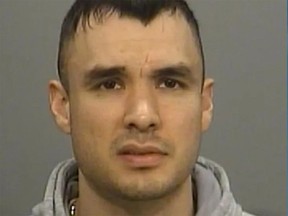
Five jurors from Brantford and Brant made no recommendations at the end of an inquest into the death of 33-year-old David Thomson who died in a Brantford hotel room in 2019.
Advertisement 2
Article content
While the jurors could have made suggestions about changing training protocols for officers facing a barricaded person, they agreed with lawyers at the inquest that nothing new could be added to the education of police.
Article content
“Mr. Thomson was a relatively young man,” said Maria Stevens, inquest counsel, in her closing statement to the jurors.
“He was on the run, wanted for murdering two people, hiding out. He had money, luggage and a gun. Sadly, he decided to take his own life. You shouldn’t be concerned if you don’t make recommendations. Not all cases require them.”
Thomson’s father, Lee Doolittle, testified at the beginning of the inquest that he had rented a room at the Days Inn on Fairview Drive for his son and, after being detained by police as he left, he begged for a chance to talk to Thomson.
Advertisement 3
Article content
Officers told the inquest it’s important to maintain police control of such situations for the safety of all and they would never involve a civilian at that point in the process.
Instead, police created a containment area, evacuated nearby guests and called out to Thomson, telling him to exit the room.
Thomson almost immediately shot himself.
The officers knew Thomson was wanted in the deaths of two people in Hamilton the previous day and was known to be armed with two handguns.
They also knew he “was erratic” and others thought he might kill himself.
The Ontario Police College teaches officers a very specific set of life priorities that puts the subject of a tactical incident on the lowest rung of the priority ladder.
Advertisement 4
Article content
Dean Streefkerk, an instructor from the college and a trainer on incident command tactics, told a coroner’s inquest Tuesday that officers are taught to ask themselves repeatedly ‘What’s important now?’
“The answer always is the priorities of life: first hostages and then victims, the public, the police and then the subject,” said Streefkerk.
After the shot in the motel room, officers tried to contact Thomson by phone and then sent in a robot equipped with cameras in order to assess the situation.
“You don’t know where the shot went,” explained Streefkerk.
“We’ve had situations in the past where someone shot around and called for help (as a trick).”
The instructor said the situation just before Thomson’s death hadn’t yet reached the point where a crisis outreach team or mental health professionals would have been called in.
Advertisement 5
Article content
Sgt. David Spencer, who was one of the team leaders of the emergency response unit from Hamilton, asserted that, saying a shot fired could be an attempt to provoke police to rush in.
“We do want to help someone who’s injured but we want to do it as safely as possible,” Spencer said.
Asked if there was any gap in police training or ideas how the situation could have been resolved differently, Spencer said no.
“I don’t believe there would be anything that could change the outcome of this incident.”
Superintendent Mark Stiller, who was an inspector on the scene four-and-a-half years ago, explained the importance of police identifying themselves immediately to the subject versus calling them on the telephone.
Stiller said the person might not believe police are there and may come to a door or window holding a firearm and end up getting shot.
The officer said he might have allowed Thomson’s father to be engaged in the process down the road if things were not going well but would never involve him in the initial contact.
Officers were questioning Doolittle and took his phone to prevent him from calling his son.
A civilian being inserted into an emergency response situation wouldn’t happen, Stiller said.
“Our tactics and planning are very deliberate and calculated. We try to control the situation and script out the plan. To introduce an unknown initially? That would not be a consideration.”
@EXPSGamble
Article content